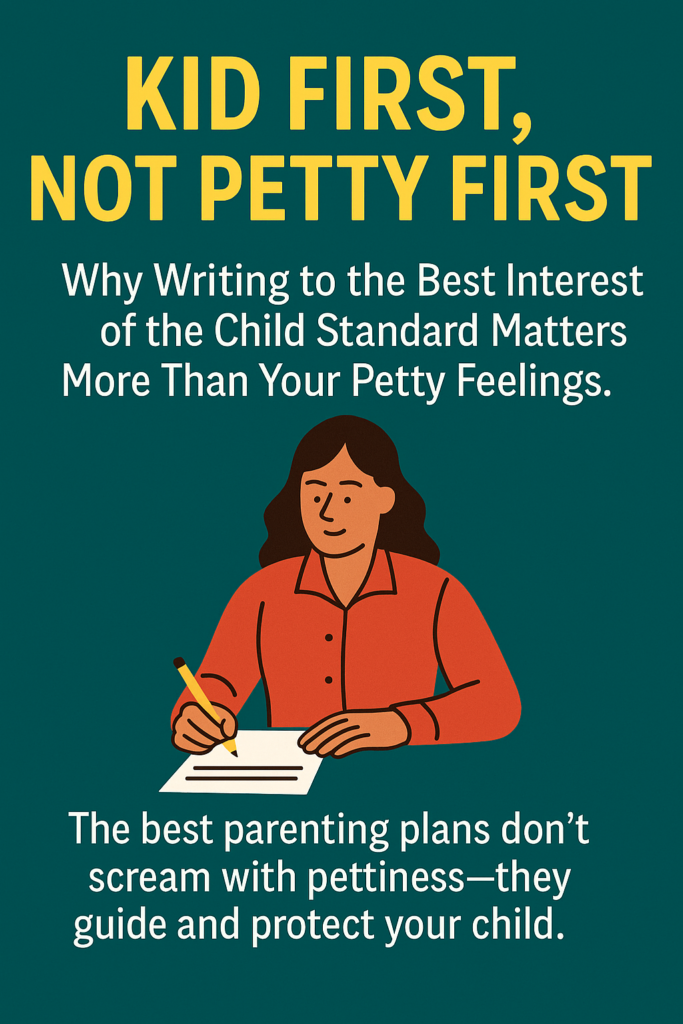
Let’s just say it:
Some parenting plans are less about parenting and more about plot revenge.
You open one up and it sounds like:
“I shall have the child on all holidays and every third moon because my ex once forgot their soccer cleats in 2017.”
Drama aside, your parenting plan is not a stage for emotional monologues. It is a legal document that should not read like your diary.
And no, “Because I said so” is not a valid clause.
📚 The Best Interest of the Child Standard = The North Star
Here is what the court actually cares about:
The kid’s stability
The kid’s safety
The kid’s growth
The kid’s right to not be dragged into adult nonsense
The Best Interest of the Child standard is the golden rule of custody cases. If your plan sounds like it was written for your healing journey instead of your child’s well-being, a judge is going to see right through it—and fast.
When you write with this standard in mind, you are showing emotional maturity, long-term thinking, and something even rarer: parenting that is not performative.
 Writing “Kid First” Changes the Game
Writing “Kid First” Changes the Game
There are two kinds of parenting plans:
Plan A:
“I want all the holidays because I’m the better parent and I brought the snacks to the soccer game.”
Plan B:
“The child will spend alternating holidays with both parents to support a sense of family connection and continuity.”
Guess which one makes you look stable, focused, and credible?
Spoiler alert: it is not the snack-bragging one.
Writing a “kid first” plan helps:
Reduce future conflict (because, shocker—clear plans don’t spark arguments)
Earn respect in court
Minimize loopholes and power plays
Give your child consistency that is actually healthy
😅 The “Mirror Test” for Parenting Plans
Let’s keep it real. If your parenting plan:
✅ Says “I” more than “the child”
✅ Has more rules for your ex than responsibilities for you
✅ Includes your feelings but not your kid’s needs
You are not co-parenting.
You are arguing with a mirror and calling it strategy.
 Loopholes Are the Gateway Drug to Co-Parenting Chaos
Loopholes Are the Gateway Drug to Co-Parenting Chaos
Here is what happens when your plan is vague:
Your ex “interprets” everything to their advantage
You end up back in mediation over spring break
Your child gets stuck in the fallout like a tiny paralegal
A clear plan that follows the Best Interest standard is the best offense and the best defense. It stops confusion before it starts and forces both parties to evolve instead of emotionally regress.
Think of it like this:
Clarity is kindness. Ambiguity is ammo.
 Judges Can Smell Pettiness
Judges Can Smell Pettiness
A judge can spot pettiness in a parenting plan the same way a toddler can spot candy in your glove box. You are not hiding it. Not even a little.
So if your plan reads like a burned diary entry, just know…
Your Honor is probably reading it with one eyebrow raised and a bottle of Tylenol nearby.
 Long-Term Peace Is Built, Not Wished For
Long-Term Peace Is Built, Not Wished For
Writing a plan based on your kid’s best interest does not mean you agree on everything. It means you agree on who comes first.
It means:
You leave space for growth
You lead with logic
You protect your kid from the whiplash of emotional warfare
And yes, it might mean being the bigger person on paper—even when you want to throw that paper across the room.
🛑 Final Word: Write Like They Will Read It One Day—Because They Might
Your child may never see the plan—but they will live it. Every vague clause becomes a future fight. Every power play becomes part of their childhood.
So ask yourself:
Am I writing this for my pride, or for their peace?
The best parenting plans do not scream.
They guide.
They protect.
They center the only person who did not choose any of this: your child.
📌 Article Too Long? Definitely Read This
Court cares about your kid, not your closure
The best parenting plans are clear, calm, and child-focused
Loopholes = chaos, not cleverness
Pettiness is not a strategy
Write like the judge is watching—and your kid might one day too
⚖️ Disclaimer
This post is for educational and informational purposes only. It is not legal advice and does not create an attorney-client relationship. Always consult with a licensed attorney in your jurisdiction for guidance specific to your custody situation or legal needs. The content reflects personal experience and general knowledge, not a substitute for professional counsel.
🔄Did you find this article helpful? Share it!

About the Author - Danny DeJesus
Danny De Jesus is a transformational resilience thought leader, strategic thinker, and the founder of Elevatus Coaching—a practice built to help people rebuild their lives after major change. Drawing from his own experiences with divorce, co-parenting, and career shifts, he created the C2R2E Framework to guide people from collapse to elevation with clarity and confidence. Through the Elevatus Blog, he shares insights for anyone navigating disruption, rebuilding direction, or shaping a new chapter with purpose.
